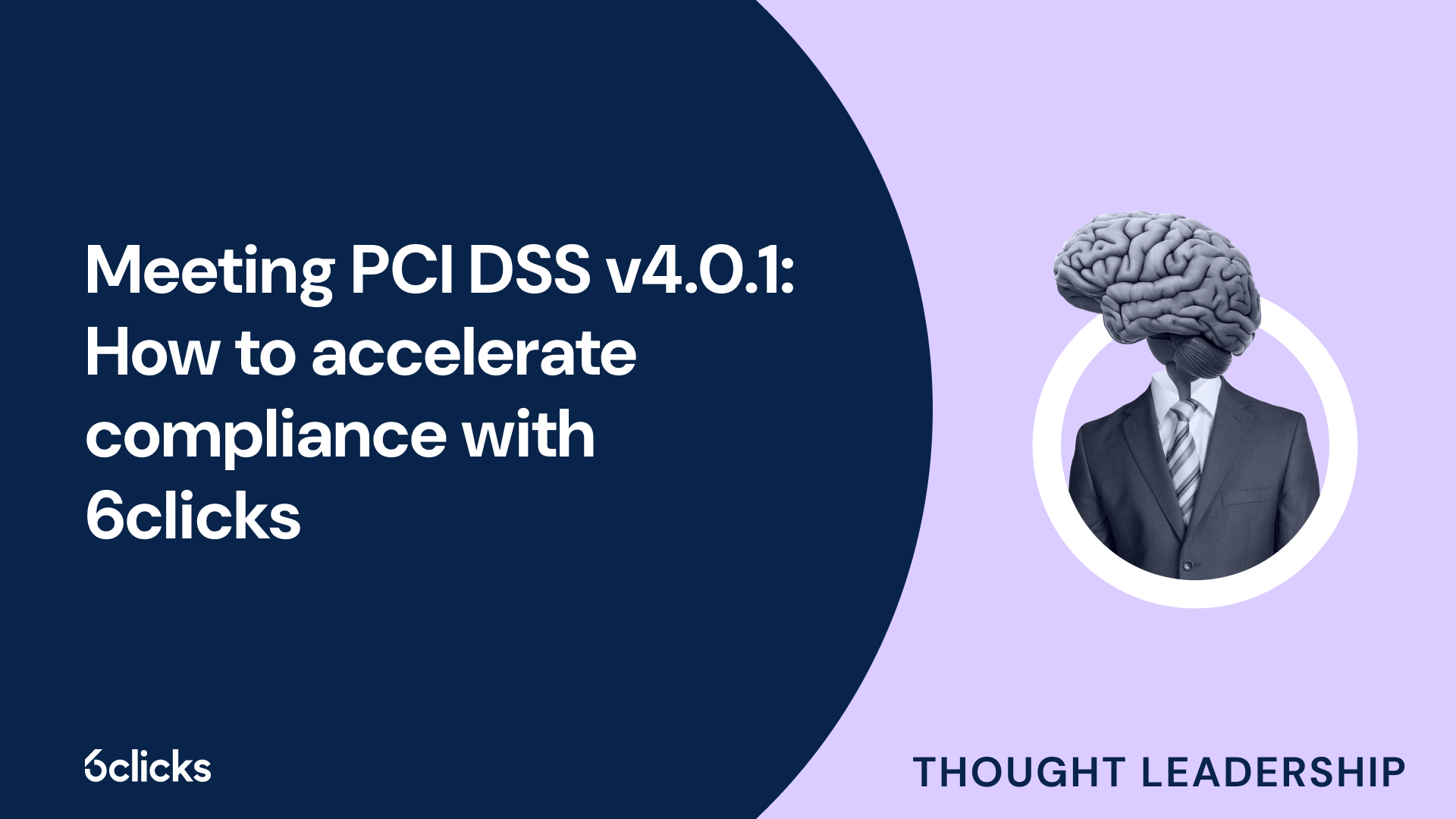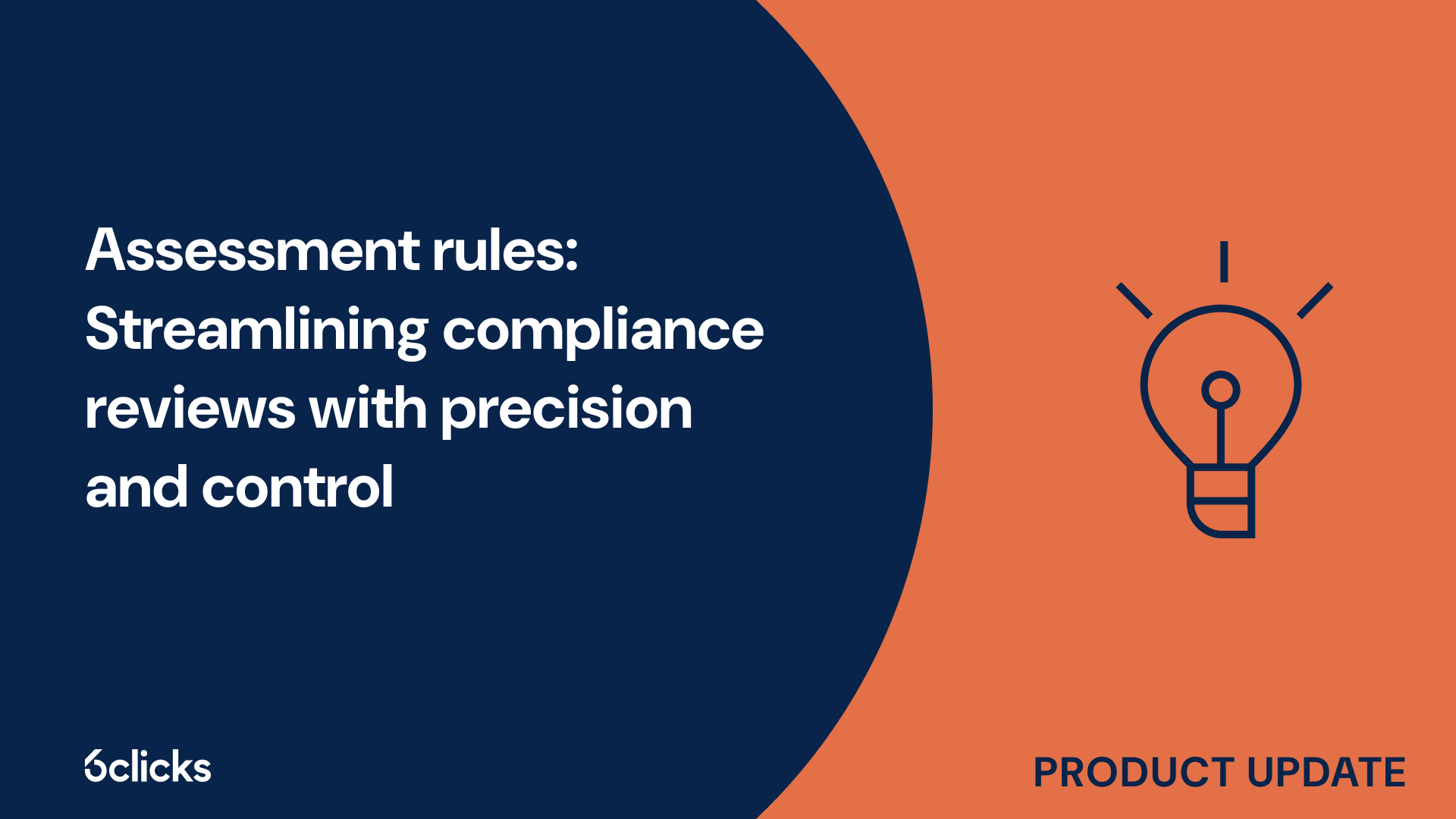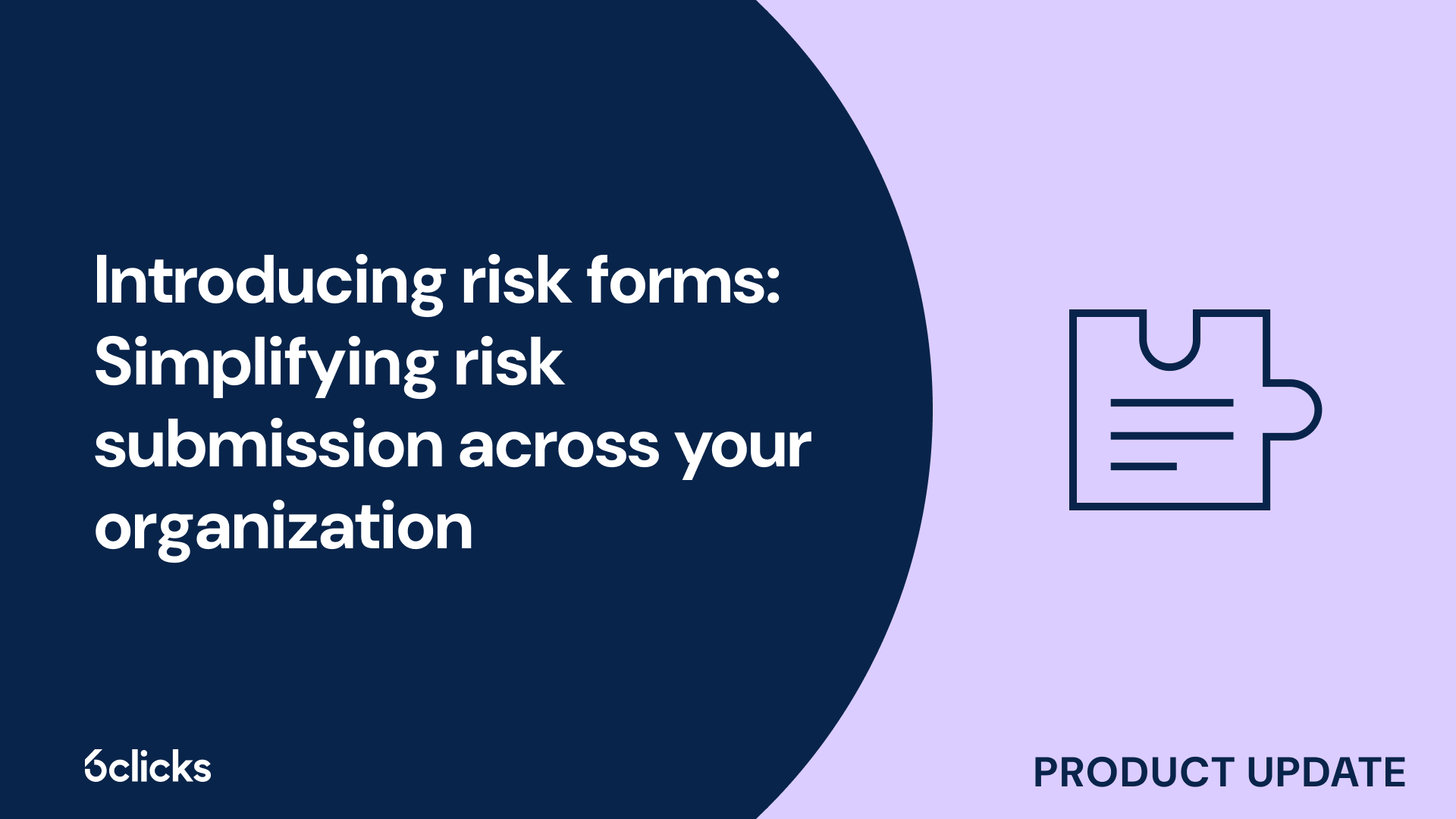The GRC buyer’s guide for 2025: Building resilience with AI-powered, federated solutions
Discover the ultimate GRC buyer's guide for 2025! Uncover how AI-powered, federated solutions transform compliance and security management for industries like government, aerospace, banking, and more. Learn about centralized control, continuous compliance, and advanced cyber GRC capabilities. Download now!
-1.png?width=200&height=249&name=Group%20193%20(1)-1.png)
The GRC buyer’s guide for 2025: Building resilience with AI-powered, federated solutions
What is an AFS licence?
An AFS license, also known as an Australian Financial Services license, is a legal license granted by the Australian Securities and Investments Commission (ASIC) that allows individuals and companies to provide financial services in Australia. Obtaining an AFS license is a necessary step for anyone who wants to operate a financial services business or provide financial products and advice to clients. The license ensures that licensees comply with the financial services laws and regulations and meet certain standards of conduct. It also establishes the licensee's public accountability and sets out their obligations and responsibilities towards their clients, the regulators, and the overall financial services industry. AFS licensees are required to have adequate resources, risk management systems, and supervisory arrangements in place to conduct their financial service businesses efficiently and effectively. They must also have responsible managers who possess the necessary skills, knowledge, and experience. AFS licensees must comply with ongoing compliance obligations, including financial reporting requirements, and maintain appropriate compensation arrangements for their clients.
Why do financial services licensees need to follow obligations?
Financial services licensees in Australia have a range of obligations that they must follow under the AFSL (Australian Financial Services License) and Corporations Act 2001. Adhering to these obligations is crucial for several reasons.
Firstly, compliance with license obligations is essential for upholding consumer protection. Licensees are required to act honestly, fairly, and efficiently when dealing with clients. By fulfilling their obligations, licensees ensure that consumers are adequately informed about the financial products and services being offered, enabling them to make informed decisions about their investments.
Secondly, following license obligations is crucial for maintaining confidence and integrity in the financial services industry. When licensees demonstrate compliance, they showcase their commitment to ethical conduct and the fair treatment of clients. This, in turn, fosters trust among consumers and investors, contributing to a positive reputation for the licensee and the industry as a whole.
Failure to comply with license obligations can result in severe legal implications. Licensees who breach their obligations may face regulatory action, investigations, or enforcement proceedings by regulatory bodies such as ASIC (Australian Securities and Investments Commission). These legal consequences can lead to hefty fines, damages, and even criminal charges for the licensee.
Key obligations of AFS licensees
Key obligations of AFS licensees can be categorized into several areas. These obligations include ensuring compliance with financial services laws, maintaining adequate risk management systems, having appropriate human resources and organizational competence, providing financial product advice on an ongoing basis, implementing adequate supervisory arrangements, meeting financial reporting requirements, and having sufficient financial resources. Additionally, licensees are required to have compensation arrangements, maintain client monies separately, and adhere to licensing exemption conditions if applicable. Licensees must also appoint responsible managers and ensure responsible entities comply with their obligations. Meeting these obligations is crucial for upholding consumer protection, maintaining confidence in the financial services industry, and avoiding legal consequences. By fulfilling these obligations, licensees demonstrate their commitment to ethical conduct, fair treatment of clients, and responsible business practices.
Responsible managers
Responsible managers play a crucial role in ensuring compliance and meeting regulatory obligations for Australian financial services (AFS) licensees. These individuals are appointed to oversee and manage the licensee's financial services business and are responsible for maintaining compliance with the applicable laws and regulations.
The compliance obligations of responsible managers are determined based on the nature, scale, and complexity of the licensee's business. Licensees must assess the risks associated with their operations and tailor their compliance procedures accordingly. This includes having adequate risk management systems, supervisory arrangements, and adequate resources in place to monitor and address compliance issues.
To demonstrate their appropriate knowledge and skills, responsible managers must meet three minimum requirements. Firstly, they must have a relevant knowledge of the financial products and services offered by the licensee. Secondly, they must have an understanding of the applicable financial services laws and regulations. Lastly, they must have the ability to apply this knowledge in a practical way to ensure compliance and promote the best interests of clients.
Financial product advice
Providing financial product advice is a crucial obligation of Australian financial services (AFS) licensees. It plays a vital role in ensuring the fair treatment of clients and maintaining the integrity and reputation of the financial services industry. AFS licensees have a responsibility to act in their clients' best interests and provide advice that is appropriate and suitable for their individual circumstances.
When providing financial product advice, AFS licensees must consider various factors. Firstly, they must satisfy suitability requirements, which means that the advice they give must be suitable for the client's financial situation, objectives, and needs. This involves conducting a thorough assessment of the client's financial position and personal circumstances. AFS licensees must also take into account their clients' tolerance for risk and their investment preferences.
Additionally, AFS licensees have disclosure obligations when providing financial product advice. They must provide clear and concise information about the advice, including any potential risks and benefits. This ensures that clients are fully informed and can make informed decisions about their financial investments.
To ensure compliance with regulatory requirements, AFS licensees should follow several steps. They should continually update their knowledge and understanding of applicable financial services laws and regulations. They should also maintain robust compliance systems and procedures, including record-keeping and monitoring mechanisms. Regular staff training and supervision is essential to ensure that the financial product advice provided is of high quality and in line with regulatory expectations.
By adhering to their obligations, AFS licensees can build trust with their clients and contribute to the overall stability and professionalism of the financial services industry.
Compliance with laws and regulations
Compliance with laws and regulations is a crucial obligation for AFS licensees. They must ensure that their financial service businesses operate in accordance with all applicable financial services laws and regulations. This includes understanding and adhering to the requirements set out by the Australian Securities and Investments Commission (ASIC).
ASIC specifies several general obligations that AFS licensees must follow. These obligations cover various areas, including conduct and disclosure, provision of financial services, competence of responsible managers and financial advisers, compliance with financial services laws, managing conflicts of interest and risk, adequacy of resources, and dispute resolution and compensation arrangements.
AFS licensees are required to conduct their financial service businesses with honesty and fairness, ensuring that their clients' best interests are prioritized. They must provide accurate and timely information to clients and disclose any potential conflicts of interest. AFS licensees must also have competent staff, including responsible managers, who possess the necessary skills and qualifications to carry out their roles effectively.
Furthermore, AFS licensees must have adequate systems and procedures in place to comply with financial services laws. This includes implementing risk management strategies, monitoring compliance, and maintaining appropriate resources. In case of disputes, AFS licensees must have effective internal and external dispute resolution mechanisms available, as well as adequate compensation arrangements for clients.
By fulfilling their compliance obligations, AFS licensees can ensure the integrity of their financial service businesses and maintain trust with their clients.
Appropriate organisational competence
Appropriate organisational competence is a key requirement for AFS licensees in the Australian financial services industry. It refers to the licensee's ability to effectively manage and carry out their financial service business in a competent and professional manner. This obligation ensures that licensees have the necessary knowledge, skills, and resources to provide reliable and quality financial services to their clients.
To demonstrate compliance with the organisational competence obligation, AFS licensees must have responsible managers who possess the required qualifications and experience to oversee and manage the licensee's operations. These responsible managers are responsible for ensuring that the licensee meets its legal obligations, adheres to ethical standards, and maintains appropriate systems and processes.
The consequences of failing to maintain the required organisational competence can be severe. Two notable cases that highlight these consequences are Lendfin and Starfish. Lendfin, an AFS licensee, failed to adequately monitor and supervise its authorised representatives, leading to inappropriate investment advice being provided to clients. As a result, Lendfin faced regulatory action and was required to pay compensation to affected clients.
Similarly, Starfish, another AFS licensee, failed to maintain appropriate organisational competence, which resulted in insufficient compliance measures and risk management systems. As a result, Starfish faced enforcement action from ASIC, leading to the cancellation of its AFS license.
The examples of Lendfin and Starfish emphasize the importance of organisational competence for AFS licensees. Failing to meet this obligation not only exposes licensees to legal and regulatory consequences but also puts clients at risk of receiving inadequate or inappropriate financial services. It is therefore crucial that AFS licensees prioritize and continuously invest in developing and maintaining their organisational competence.
Risk management systems
Risk management systems play a crucial role in the operations of AFS licensees in Australia. These systems are instrumental in identifying, assessing, and mitigating risks associated with financial services businesses. AFS licensees have obligations to establish and maintain adequate risk management systems to ensure the protection of their clients and the integrity of the financial services industry.
Under the Australian financial services laws, AFS licensees must allocate adequate resources to their risk management systems. These resources include financial, human, and technological resources necessary to effectively manage risks. AFS licensees are also required to establish robust processes for identifying, assessing, and mitigating risks. This involves regularly reviewing and updating risk management strategies, as well as implementing appropriate internal controls and procedures.
Key elements that should be included in a robust risk management system for AFS licensees include comprehensive risk identification processes, thorough risk assessment procedures, and effective risk mitigation strategies. AFS licensees should also have mechanisms in place to monitor and review the effectiveness of their risk management systems on an ongoing basis. By implementing these elements, AFS licensees can demonstrate their commitment to compliance and safeguarding the interests of their clients.
Overall, risk management systems are essential for AFS licensees to fulfill their obligations and operate responsibly within the financial services industry. By allocating adequate resources and implementing robust processes, AFS licensees can effectively identify, assess, and manage risks, thereby protecting their clients and maintaining the integrity of the industry.
Human resources requirements
Human resources play a crucial role in the operations of Australian Financial Services (AFS) licensees. AFS licensees are required to have knowledgeable and skilled Responsible Managers who are responsible for making day-to-day decisions regarding the provision of financial services. These managers should possess appropriate knowledge and skills to ensure compliance with regulatory requirements and to effectively manage risks.
To demonstrate the appropriate knowledge and skills, Responsible Managers have several options. They can hold relevant educational qualifications, such as a degree in finance or a related field. They can also have extensive industry experience, demonstrating their practical knowledge and expertise. Another option is completing relevant training courses or obtaining professional certifications that are recognized in the financial services industry.
Failing to meet the organisational competence obligation can have serious consequences for AFS licensees. It may lead to regulatory breaches, loss of client trust, and reputational damage. Additionally, non-compliance with this obligation can result in civil penalty provisions being imposed by regulatory authorities. It is therefore imperative for AFS licensees to ensure that they have Responsible Managers who possess the appropriate knowledge and skills to fulfill their obligations and safeguard the interests of their clients.
Supervisory arrangements for wholesale and retail clients
Supervisory arrangements play a crucial role in ensuring that Australian Financial Services (AFS) licensees effectively monitor and oversee the activities of both their wholesale and retail clients. When establishing these arrangements, AFS licensees must consider several key factors to comply with their obligations and meet regulatory requirements.
For retail clients, AFS licensees need to have robust supervisory arrangements in place. This includes conducting regular reviews of client files, monitoring client interactions, and providing ongoing training and guidance to staff members. This ensures that retail clients receive appropriate advice and services that align with their financial goals and risk tolerance.
When it comes to wholesale clients, AFS licensees still need to have supervisory arrangements in place, although these arrangements may be less extensive. Licensees must conduct periodic reviews to ensure that wholesale clients receive suitable financial products and services. This involves assessing if the financial products or services are appropriate for the client's needs and objectives.
To establish effective supervisory arrangements, AFS licensees should consider factors such as the specific needs and characteristics of their clients, the complexity and risks associated with the financial products or services provided, and the capacity and expertise of their staff members. Regular monitoring, oversight, and documentation of these arrangements are vital to ensure compliance with regulatory requirements and to uphold the interests of clients.
Adequate arrangements for ongoing basis for retail clients
AFS licensees have several obligations to ensure they have adequate arrangements in place for the ongoing basis of their retail clients. These obligations are crucial for maintaining the integrity and trust of the financial services industry. AFS licensees must regularly review and assess the needs and objectives of their retail clients to provide suitable financial products and services. This includes conducting periodic reviews of client files, monitoring client interactions, and providing ongoing training and guidance to staff members.
Additionally, AFS licensees must establish supervisory arrangements that are robust and tailored to the specific needs and characteristics of their retail clients. This involves considering factors such as the complexity and risks associated with the financial products or services provided, as well as the capacity and expertise of their staff members. Regular monitoring, oversight, and documentation of these arrangements are necessary to ensure compliance with regulatory requirements and to uphold the interests of retail clients.
By fulfilling these obligations, AFS licensees can ensure that their retail clients receive appropriate advice and services that align with their financial goals and risk tolerance. Adequate arrangements on an ongoing basis contribute to the overall protection and satisfaction of retail clients and promote trust and confidence in the financial services industry.
Reasonable grounds for exemption from requirement to hold an AFS licence
Reasonable grounds may exist for an entity to be exempt from the requirement to hold an AFS (Australian Financial Services) licence. The Australian Securities and Investments Commission (ASIC) may grant exemptions under specific circumstances. Some of these circumstances include situations where an entity provides financial services as a means of carrying out its main business that is not financial services related, or when the financial services are only provided to a limited group of clients who are not considered retail clients.
When considering an exemption, ASIC takes various factors into account. These factors include the size, nature, and complexity of the entity's financial service business, the degree of public accountability, and whether the entity has adequate resources and arrangements to provide compensation in the event of loss or damage. ASIC also considers whether granting an exemption would promote the efficiency and flexibility of the financial services industry while still maintaining appropriate consumer protection measures.
To apply for an exemption, an entity must submit a written application to ASIC. The application should outline the reasonable grounds for the exemption and provide supporting evidence. ASIC will then review the application and may consult with the applicant or other relevant parties as part of the assessment process. It is important for entities seeking an exemption to seek legal advice and ensure they meet the necessary requirements and obligations under the regulatory framework.
Application process for an AFS licence
The application process for an AFS (Australian Financial Services) licence involves several steps and requirements. AFS licence applicants must demonstrate their ability to comply with the obligations set out in the financial services laws and regulations. These obligations include having adequate risk management systems, financial resources, and compensation arrangements in place. The application for an AFS licence should outline the entity's reasonable grounds for seeking the licence and provide supporting evidence. The Australian Securities and Investments Commission (ASIC) reviews the application and may consult with the applicant or other relevant parties during the assessment process. It is crucial for applicants to seek legal advice to ensure they meet all the necessary requirements and obligations under the regulatory framework.
Completing the application Form correctly and accurately.
Completing the application form correctly and accurately is crucial when applying for an Australian Financial Services (AFS) licence. This process involves certain requirements that need to be fulfilled to ensure a smooth licensing application.
One of the primary tools used in this process is ASIC's eLicensing System, an online platform designed to streamline the licence application and management process. It is essential to familiarize oneself with this system and ensure that all information provided is accurate and up to date.
In addition to completing the application form, certain core supporting documents must be submitted. These typically include proof of financial resources and an audit report, which are required to demonstrate the ability to meet financial obligations.
Moreover, a well-defined business structure with responsible managers is crucial to meet the regulatory expectations of the application process. Properly identifying the roles and responsibilities of these managers is important for compliance with the licensing requirements.
Meeting the financial requirements.
Meeting the financial requirements is a crucial aspect for Australian Financial Services (AFS) licensees to fulfill their compliance obligations. This involves demonstrating the ability to effectively manage financial resources and ensure adequate funding to cover ongoing cash flow expenses.
Cashflow projections play a vital role in meeting these requirements. Licensees need to provide detailed projections of their expected cash inflows and outflows over a specific period of time, typically one to three years. This helps regulators assess whether the licensee will have sufficient funds to cover their financial obligations and maintain a viable financial position.
To meet the cash needs requirement, AFS licensees have several options as described by Regulatory Guide 166 (RG166). These options include maintaining net tangible assets (NTA) at a specified level, holding a certain amount in surplus working capital, or maintaining a minimum level of liquid net assets.
By meeting these financial requirements, licensees are able to demonstrate their ability to meet ongoing financial obligations, safeguard client monies, and maintain the overall integrity of the financial services industry. It also ensures that licensees are adequately equipped to operate responsibly, protecting the interests of both retail and wholesale clients.







